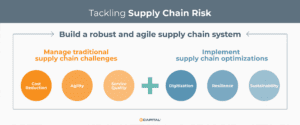
Navigate Through Supply Chain Risks With Alternative Financing
Content
It’s been nearly three years since the start of the pandemic, and challenges with supply chains, including disruptions, cost increases, and raw-material shortages, remain a pressing concern. Geopolitical conflicts, inflationary pressures, economic unpredictability, climate change weather events, and other emerging issues continue to impact how raw materials are converted into finished products and distributed to end customers.
Companies that transform their supply chain by establishing robust capabilities and continue to innovate will be better positioned to withstand a range of supply chain risks to support improved operational stability.
Alternative financing can play a critical role in helping companies manage supply chain transformation by providing financial support and strategic resources that contribute to building a resilient and adaptable supply chain.
Learn to tackle supply chain risk with alternative financing in this article. We will explore how fast access to working capital can be leveraged to help build a robust and agile supply chain that can navigate through various risks.
What are supply chain risks and how to manage them
Supply chain risks encompass potential disruptions, vulnerabilities, and uncertainties that can impact the movement of goods and services from suppliers to customers. These risks can arise from various sources and have significant implications for businesses, including financial losses, operational disruptions, and damage to reputation.
While traditional supply chain challenges such as cost reduction, agility, and service quality remain vital to success, three additional components are essential for future supply chain leaders – digitization, resilience, and sustainability. Progressive companies are expanding their supply chain capabilities beyond their business borders, building real-time collaboration with partners, and developing end-to-end system visibility to enhance collaboration across the supply chain ecosystem.
Recognizing the supply chain as both a potential source of risk and a driver of competitive advantage, business leaders are taking a strategic approach to supply chain optimization. This approach allows them to mitigate risk, respond faster to disruptions, and deliver products or services more efficiently than their competition. To realize these goals, many forward-thinking companies are making substantial investments in their supply chain, supported by alternative lenders who offer improved cash flow solutions and fast access to working capital.
Cash flow solutions and fast access to working capital
Financing challenges have intensified as traditional business loans become more challenging to obtain. In this low-growth environment of high-interest rates, rising operational costs, and declining demand, many small and medium-sized businesses (SMBs) are experiencing difficulties in securing traditional business financing from conventional lenders. Fortunately, alternative lenders are stepping in to address this credit gap.
Alternative lenders take a different approach to credit qualification compared to traditional lenders. Instead of relying on a company’s credit score and financial statements, alternative lenders assess the value of the business’s assets to be used as collateral. This approach allows companies with unencumbered assets to access credit even if they have underperforming business levels and less-than-ideal credit scores. Companies with regular accounts receivables from creditworthy customers, inventory, machinery, or equipment can qualify for various financing options to improve cash flow and maximize access to working capital.
Work with a leading alternative lender experienced in your industry. These lenders have the knowledge, expertise, and resources to best provide tailored funding options that align with your company’s goals and repayment capabilities. The two most used and powerful alternative financing options for sustaining operations, fueling growth, and supporting investments are:
Asset-based lending (ABL): ABL provides a business line of credit secured by the company’s accounts receivable, inventory, machinery, and equipment as collateral. The amount of credit extended is directly proportional to the value of the pledged assets, offering businesses the flexibility to get loans without heavy reliance on their credit score. Alternative finance companies specializing in ABL have streamlined processes and provide covenant-light lending agreements. This makes it easier for businesses to access capital and utilize funds as needed.
Invoice factoring: This funding option provides immediate positive cash flow by selling the company’s receivable invoices to an alternative lender at a discount in exchange for immediate cash. The funding process is exceptionally fast thanks to advanced technology that swiftly verifies invoices against purchase orders and delivery receipts. This allows alternative finance companies to approve funding requests and transfer funds within hours. Invoice factoring is an instant remedy for cash flow constraints without incurring debt.
Although factoring is asset-based, it is structured differently from asset-based lending. This form of funding only leverages a company’s book of accounts receivable to access capital, providing different risks, costs, and benefits to the customer.
Both these alternative financing options provide the capital businesses need when they need it to help advance companies forward. Progressive companies are utilizing alternative financing options to invest in and develop a robust and agile supply chain system.
Building a robust and agile supply chain system
A mature supply chain system should always be a step ahead and ready to tackle risks and opportunities as they arise. Diversifying your network of suppliers and partners is key to adaptability, but much more is needed. Investments in digitization, resilience, and sustainability are essential to maintain a robust and agile supply chain.
Digitization: Enhanced digital tools and technologies improve operational efficiency, provide end-to-end system visibility, and enable real-time decision-making. Extending your supply chain beyond your business borders using enhanced data collection and real-time indicators to monitor events is essential for efficient management. Invest in emerging cloud-based supply chain platforms that bring all capabilities together in one integrated platform to provide a seamless user experience.
Resilience: Businesses need to invest not only in technology but also in training and development programs for supply chain professionals to mitigate risk and maintain operational momentum. Encourage a culture of continuous learning and improvement within the organization to enhance skills and expertise in supply chain planning and management.
Build a supply chain planning process that aligns with business objectives and outcomes, encompassing:
- Product portfolio planning
- Demand planning
- Supply and inventory planning
- Sales & operations planning (S&OP)
- Sales and operations execution (S&OE)
A mature supply chain planning capability combined with end-to-end system visibility and collaboration within the supply chain ecosystem is key to achieving greater agility and resilience.
Sustainability: The best way to protect your business from supply chain risk is to be prepared for the worst while hoping for the best.
Develop and execute short-term plans as actual orders are received from customers with a defined due date. When those orders become repetitive, increase meeting frequency to identify unexpected developments quickly. Create long-term plans with built-in flexibility to establish a sustainable supply chain capable of navigating risks and optimizing opportunities.
Conclusion
In a volatile and uncertain market, SMBs must become more agile and resilient to manage supply chain risk and maintain operational momentum. Diversify your network of suppliers and build collaborative partnerships within the supply chain ecosystem to minimize disruption, control costs, and ensure the timely delivery of goods and services. Prioritize investments in technology for end-to-end capabilities, data collection, and visibility. Encourage a culture of continuous learning and improvement within the organization to enhance supply chain skills and expertise in planning and management.
Leverage alternative lenders’ credit availability to enhance cash flow and maximize access to working capital. Utilize their flexible financing options to fund the development of a robust supply chain system designed to navigate risks and maximize opportunities effectively. To further assist, experienced and reputable alternative financing companies bring their technology and expertise to help achieve growth and success through turbulent times.
Key Takeaways:
- Cost increases and raw-material shortages further aggravate continuing supply chain disruptions.
- Companies with robust supply chain capabilities and innovation are better equipped to manage supply chain risks.
- Progressive companies extend supply chain capabilities beyond their business borders, focusing on data collection, visibility, and collaboration across the supply chain ecosystem.
- Many companies leverage alternative financing options to invest in their supply chains to navigate risks and optimize efficiencies.
ABOUT eCapital
Since 2006, eCapital has been on a mission to change the way small to medium sized businesses access the funding they need to reach their goals. We know that to survive and thrive, businesses need financial flexibility to quickly respond to challenges and take advantage of opportunities, all in real time. Companies today need innovation guided by experience to unlock the potential of their assets to give better, faster access to the capital they require.
We’ve answered the call and have built a team of over 600 experts in asset evaluation, batch processing, customer support and fintech solutions. Together, we have created a funding model that features rapid approvals and processing, 24/7 access to funds and the freedom to use the money wherever and whenever it’s needed. This is the future of business funding, and it’s available today, at eCapital.


